The Graveyard of Coffee Kickstarters
There are a lot of coffee gadgets on Kickstarter. Some are successful, others less so. This is the story of the latter.

Everyone loves a coffee gadget.
If you search “coffee” on the crowdfunding site Kickstarter, you get 4,542 results. They’re not all gizmos, of course; some are coffee table books, espresso-infused beauty products, or small companies trying to open a cafe.
These are not the projects we’re concerned with today. No, we’re looking at Kickstarted coffee gear—the brewers, grinders, internet-of-things-enabled home roasters, and sometimes a combination of all three that have relied on early adopters to fund their development.
There have been plenty of hugely successful Kickstarter coffee campaigns—Fellow’s sleek range of kettles and brewers raised money via the platform, as did Flair’s manual espresso machine and Ikawa’s home roaster—but those are also not the projects we’re going to focus on.
Kickstarted coffee products are very popular. It feels like a new gadget is being announced every other week—Sprudge has 13 pages dedicated to weird and wonderful examples, while Daily Coffee News returns 231 results for the term “kickstarter”.
Like all new products, some of the coffee projects that launch on Kickstarter never make it past the development stage. Taking a concept from idea to reality—especially mass-produced reality—is incredibly difficult, and even new products from multinational corporations fail. On a small scale it’s even harder, as creators have to deal with multiple vendors and manufacturers using limited resources and experience.
Even though they get a lot of the coverage, Kickstarter failures are actually quite rare. According to research by Ethan Mollick from the Wharton School of the University of Pennsylvania, only about 9% of Kickstarter projects fail to deliver, although another of Mollick’s studies notes that a vast majority are delayed.
Unfortunately some of the most high-profile failures also happen to be coffee devices. Let’s take a look at some of the most (in)famous examples of coffee Kickstarters that promised much, and never delivered.
Voyager Kettle, 2019 — $43,548 pledged by 406 backers — 33 updates — 160 comments

Travel coffee gear is a big deal—just look at the Aeropress—but a challenge has always been finding hot water on the road. The Voyager Kettle from Nomad Joe seeked to change that, raising funds for a collapsible gooseneck kettle with variable temperature control.
Lightweight and portable, it was featured in Sprudge, Gear Patrol, and Daily Coffee News, among other places. “For our project, it was about designing everything in a way to fit in a smaller space and collapse down in a compact manner,” Ryan Mack of Nomad Joe told Daily Coffee News. The target audiences, Mack said, were traveling coffee professionals, RV folk, and anyone else who desired pour over coffee in a confined space.
406 people ended up backing the project. Nomad Joe’s stated goal was to ship the Voyager in June 2020, but as the increasingly irate comments on the product’s Kickstarter page make plain, that didn’t happen.
The Nomad Joe team continued to post updates—33 as of this writing—with issues ranging from handle stability on the prototype to safety certification problems. As they progressed, the comments became meaner and meaner, with constant demands for refunds. The latest update seems to contain a glimmer of hope for Voyager Kettle backers, which is more than can be said for some of what’s to follow.
At this point it’s probably worth pausing to discuss what Kickstarter, and crowdfunding in general, actually is. Crowdfunding, as its name suggests, is the act of raising money from a large number of people in order to fund a project or venture. Kickstarter is based around creativity—in the beginning it didn’t support manufactured products—and the site makes a point to remind backers that “Kickstarter is not a store.” Instead, backers “pledge to projects to help them come to life and support a creative process. To thank their backers for their support, project creators offer unique rewards that speak to the spirit of what they're hoping to create.”
Keep that in mind, because the comments/actions from backers are going to get progressively worse as the projects get more complicated and the money increases.
Flask, 2018 — $201,936 pledged by 2,274 backers — 31 updates — 726 comments
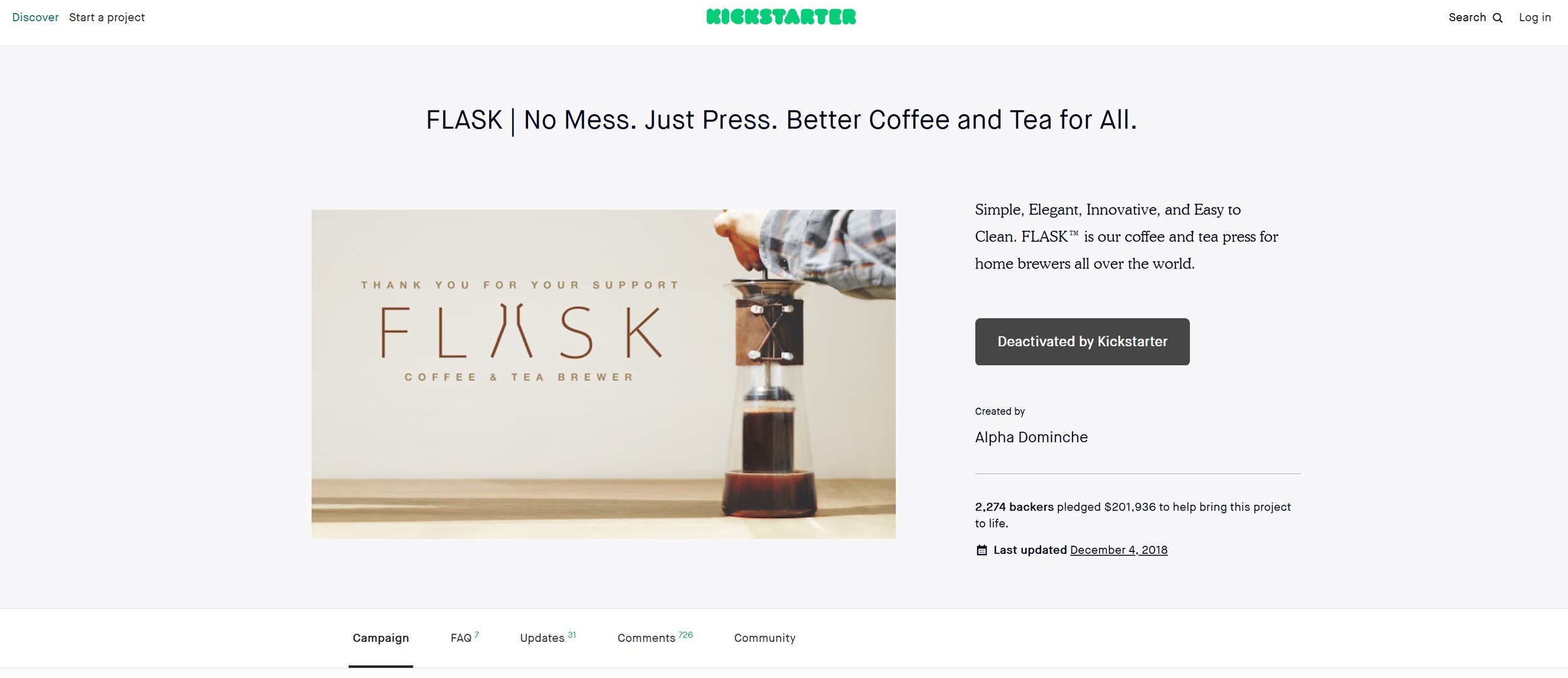
Specialty coffee aficionados of a certain vintage might remember the Steampunk, Alpha Dominche’s high-end $15,000 customizable immersion brewer that won the Specialty Coffee Association of America (as it was then known) Best New Product of 2012.
Alpha Dominche’s foray into consumer brewing equipment was a little less flashy, but the Flask was hotly anticipated—with an original goal of $40,000, it ended up raising over $200,000—by offering backers “the distilled version” of the Steampunk with a French press-slash-Aeropress home brewer.
Once again, the Flask caught the attention of the press, which makes sense—outlets just need things to write about, and new products are easy. The Kickstarter was a huge success, ending up with more than four times its original goal, and the early updates were positive.
The first production update came on June 1, 2018. Then on December 4, Alpha Dominche shut down without warning. “The Company greatly apologize for this news, the hardship it causes, and will keep you all informed of any updates,” the announcement read. “You may not receive any correspondence for some time while this situation is finalized.”
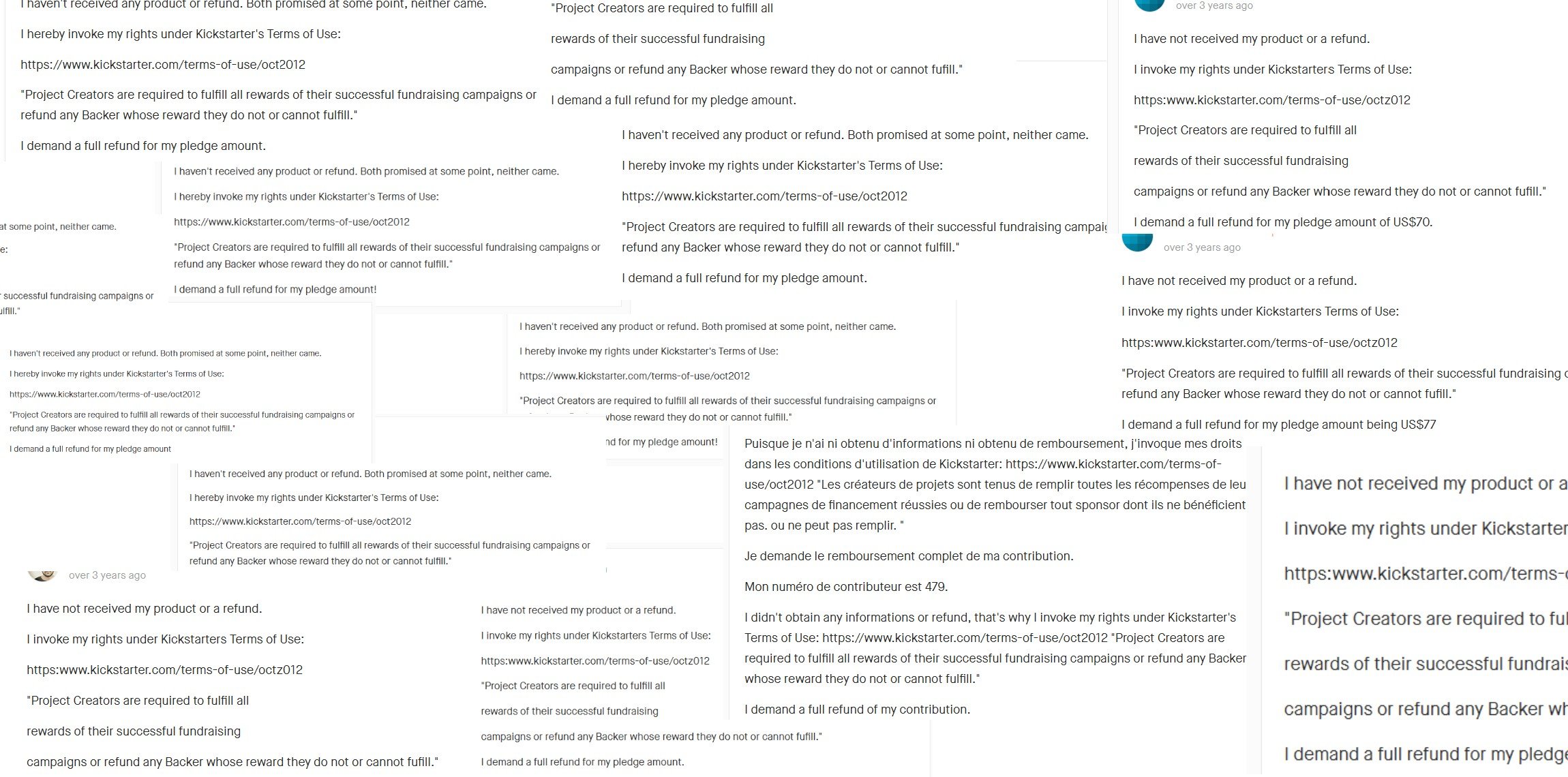
Judging by the comments, there was never any correspondence—even when the Flask was revived by another company. Many of the commenters used a copypasta of sorts to try to “invoke” their rights under Kickstarter’s terms of use. Others talked of a class action lawsuit, and still others threw the words “fraud” and “scam” around. But hey, at least not many personal insults or outright threats (we’ll get to those later on).
Rite Press, 2018 — $1,086,974 pledged by 21,771 backers — 29 updates — 10,504 comments
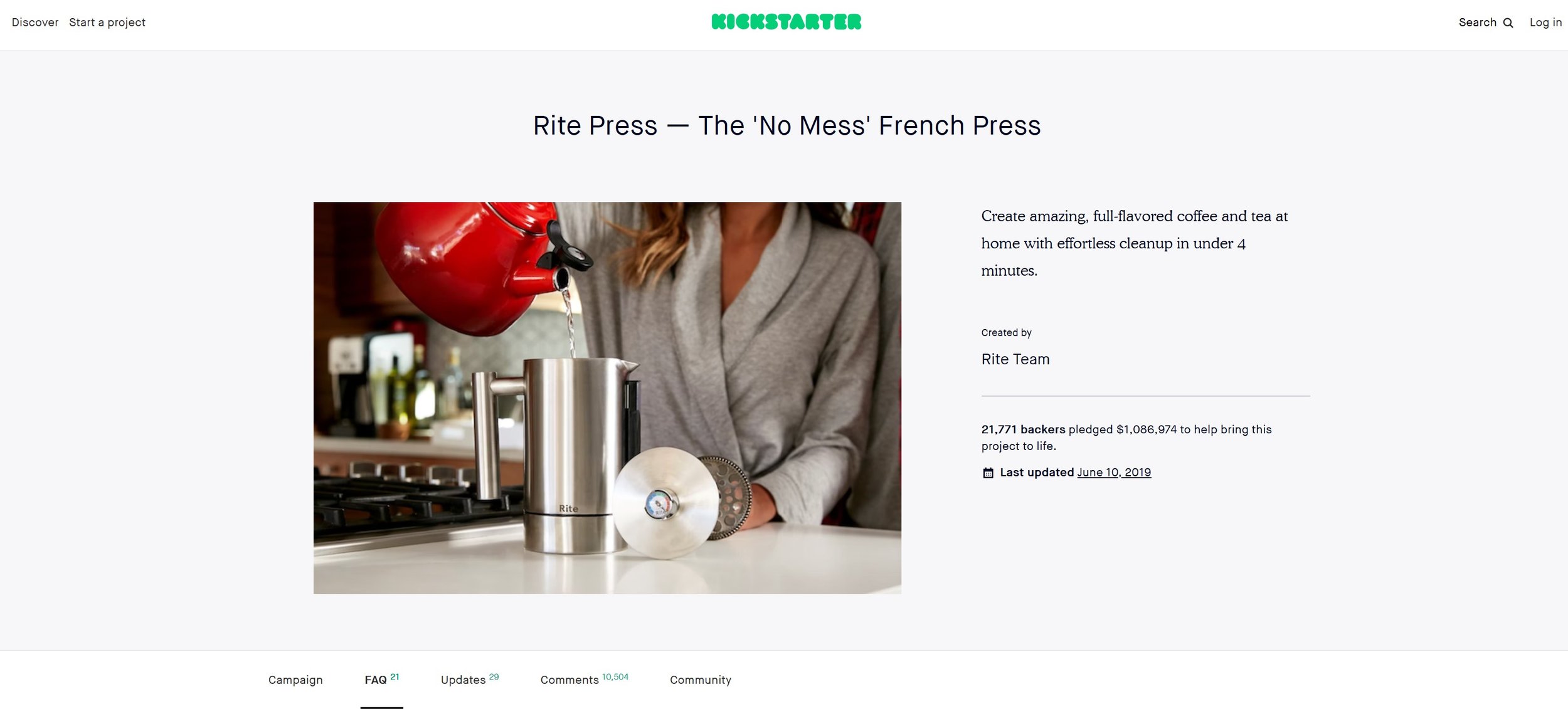
Holy moly, that’s a lot of money. And judging by the number of comments, and the number of articles written about it, the Rite Press was quite the flim-flam.
The “no mess French press” also dubbed itself the “#1 coffee product on crowdfunding of all time!” and got a lot of press, going more mainstream than most of the other products on this list (which might account for how much cash it raised).
Essentially a French press with a removable base for easy cleanup, the Rite Press had an easy selling point—have you ever cleaned up a French press? It’s the worst. A simple device like that was obviously attractive, and should have been relatively easy to manufacture (compared to some of the items on this list, at least).
Launched in February 2018, the Rite Press reached its $20,000 goal in just 24 hours, with delivery scheduled for March. That never happened, obviously, and the delivery date kept getting pushed back, before updates ceased completely. According to Business Insider (yes,the Rite Press got its own lengthy investigative piece at the time) a few backers did begin to receive their presses in dribs and drabs, while a plastic version called the Essential+ showed up on Amazon.
In February 2019 Rite Press founder Sargam Patel reached out to backers to ask for more funding, claiming that the average pledge of $35.26 was eclipsed by the $66.72 cost of producing and shipping a press. “There is simply no funding available to give refunds,” Patel wrote. Alongside additional funding from backers, the Essential+ was supposed to raise the money necessary to complete the project.
Reviews of the Essential+ are… iffy to say the least, with standout keywords like “scalding hot”, “poor quality”, and “piece of junk”.
Comments on the Kickstarter are still pouring in, five years later. “Yo where’s my French press?!?!?” reads one. “SCAM, shame of kickstarter for supporting this looser…. don’t worry, you can go buy a plastic “the rite press” on amazon…. get bent!” another (presumably) yells. One simply reads, rather mournfully, “When French press”.
Lots of personal insults here, which I won’t recount, and it seems as though Patel and the Rite Press sort of disappeared. but let’s end on a slightly less caustic note. One commenter wrote, “If more backers understood the difference between crowdfunding investments and online shopping this project may have been very different.”
Kickstarter is not a shop.
Bonaverde, 2013 — $681,461 pledged by 2,254 backers — 153 updates — 3,620 comments
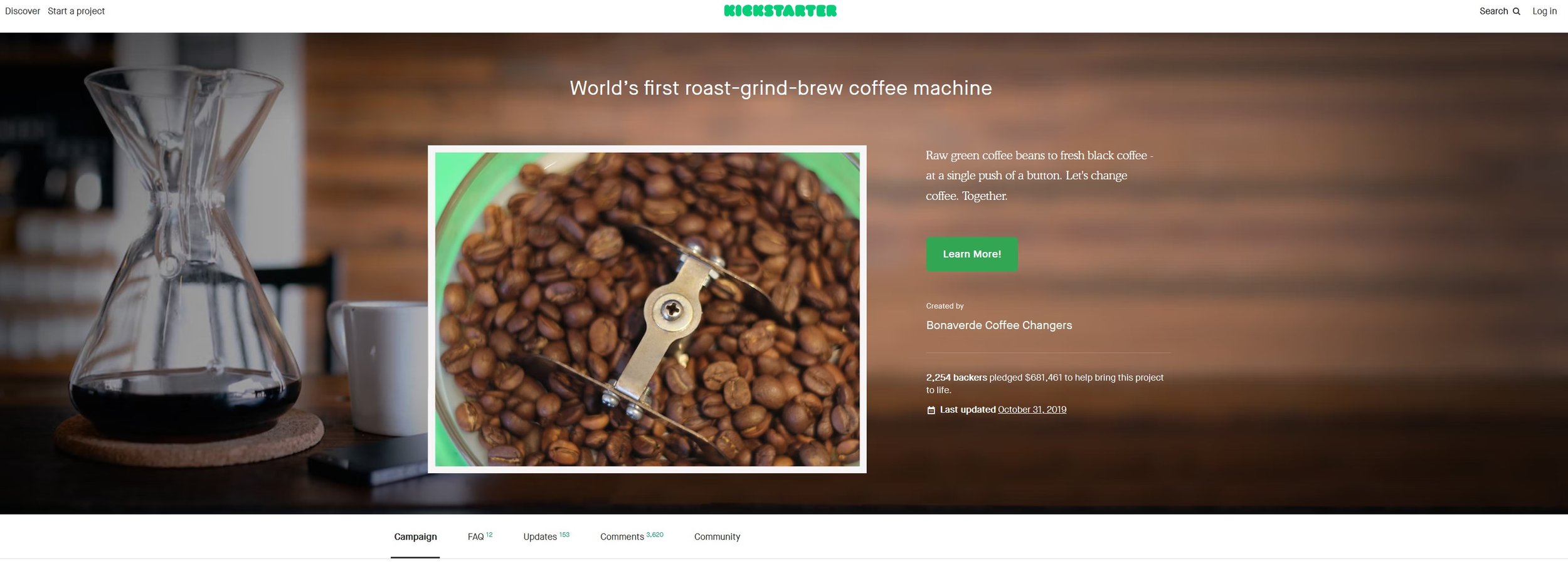
“Farm to table? Try tree to cup.” So began a piece in Huffington Post in 2013 about Bonaverde’s machine as it launched on Kickstarter. The “World’s first roast-grind-brew coffee machine” was available to backers for just $300. Three hundred dollars! For a coffee roaster, grinder, and brewer, all in one! Roast, brew, and drink your coffee in minutes!
It was catnip to the press, who showered the company with positive publicity. Meanwhile, almost every coffee professional recommends letting coffee rest at least a couple of days after roasting to allow carbon dioxide and other gases to escape.
Bonaverde ended up raising an additional $125,000 on Indiegogo and €1.33 million on the German site Seedmatch, but then the delays began—a projected 2014 delivery date got pushed back by two years, with many backers upset that the company altered the device’s design post-crowdfunding.
Part of Bonaverde’s pitch was that it would connect consumers directly to the farmers who grew their coffee. “Farmers become faces and you become a coffee changer,” the Kickstarter page asserted. Their stated goal was to “disrupt the value chain, empower farmers and bring you the fairest and freshest coffee experience right into your own home.”
A design change announced in 2014 involved the internet of things, where Bonaverde would ship green beans directly to the consumer complete with an individualized RFID chip to be scanned by the machine. The machine, connected to the cloud, would then roast, grind, and brew the coffee to specific predetermined parameters.
This, Bonaverde said, was to make things easier for the casual coffee drinker (you know, all those casual coffee drinkers who want to own a roaster-grinder-brewer). But backers wondered if this would potentially lock them into Bonaverde’s proprietary distribution system, forcing them to only buy green beans from the company and use the company’s parameters.
Some backers asked for refunds, which Bonaverde said would happen “as soon as we make enough profits to pay you out.” Spoiler alert: that never happened.
In 2017 some machines began to ship, as the company secured more money through the equity crowdfunding app Seedrs. The Berlin, as it was now called, was reviewed in PC Magazine, CNET, and Engadget and went on general sale for $799-$1000. But many, many backers never received a machine, and Bonaverde abruptly shut down in 2019. In a lengthy post on the company’s now-defunct website founder Hans Stier bemoaned that the team “got lost in other ideas, business models and strategies” such as the now-also-defunct Urban Coffee Club app (he’s now a real-estate investor, according to LinkedIn).

Meanwhile, comments are still occasionally popping up from backers utterly befuddled by the lack of communication.
ZPM Espresso, 2011 — $369,569 pledged by 1,546 backers — 59 Updates — 1,499 Comments
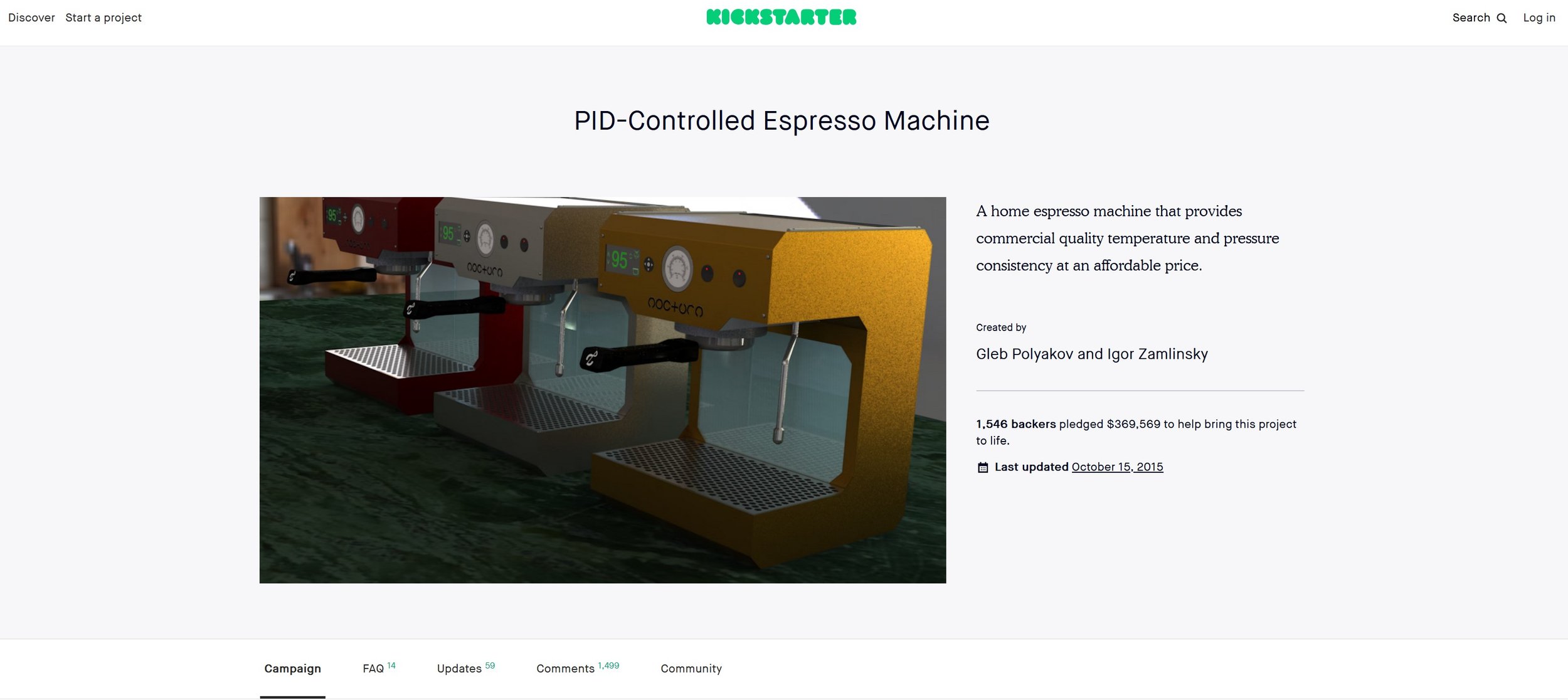
I wanted to finish on this one, because researching it has left me feeling sad and ambivalent about the whole Kickstarter thing. On the one hand, a lot of people gave a lot of money for this project (and all the previous projects) and were probably entitled to feel a little aggrieved (if not misled) by its failure and lack of communication from its creators.
On the other hand, Kickstarter is not a shop. Most of these devices, bar perhaps the Rite Press, were ambitious engineering projects being helmed by inexperienced dreamers. And reading this excellent New York Times piece from 2015 on the fallout from ZPM Espresso’s failure puts a human face to that inexperience.
The article starts with a disgruntled backer organizing his fellow marks in the wake of ZPM’s collapse. Could it be a class-action lawsuit, or possibly some consumer-protection suit? Lots of amateur-detectiving followed, and lots of personal attacks on the creators whom backers thought had acted deceitfully.
The ZPM Espresso, a PID-controlled home espresso machine, was supposed to provide “commercial quality temperature and pressure consistency at an affordable price.” Their product, the creators promised, would make espresso at the same level as prosumer machines double the price.
You can see why this would be attractive to home coffee geeks, and so it proved—the project was a huge success, and the team ended up overwhelmed with orders. Orders that it turned out to be nearly impossible to fulfil. Shipping dates got pushed back, manufacturing issues arose, and ZPM started hemorrhaging cash. They also stopped communicating with backers, which is where a lot of the hostility seems to have come from.
ZPM eventually threw in the towel—cue much rancour from backers—and licensed the technology to what would eventually become Decent Espresso, a more expensive but far more robust home espresso machine. In exchange, ZPM backers received a $200 discount on one of Decent’s machines.
Among all the mudslinging and name-calling, there were some more positive comments from backers. And the NYT article lends complexity and humanity to the floundering creators, showing them a far cry from the duplicitous hucksters that fleeced well-meaning coffee geeks.
“Despite the deranged conspiracy-mongering ideas to which some of them ultimately clung,” the piece recounts, “the reality of ZPM’s failure was pretty banal: The founders were naïve and inexperienced, well intentioned but clumsy, and they serially trusted and paid the wrong people for ineffective help.”
Which, based on the other entries in this graveyard of coffee Kickstarters, could refer to any number of creators.






